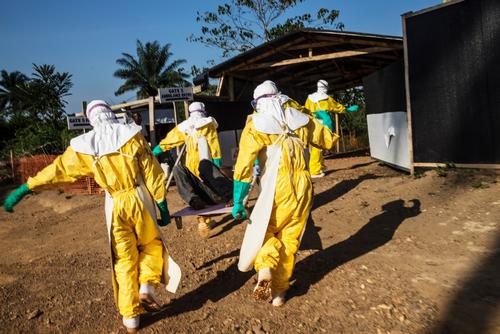Brussels – In a new book released this week, Médecins Sans Frontières (MSF) argues that the response to the West African Ebola epidemic of 2014–2015 was led by fear rather than medical priorities. The Politics of Fear highlights how patients and their care were not sufficiently prioritised, as security and containment not solidarity became the biggest prerogative of governments and organisations supporting the response.
While misinformation, panic and isolation featured heavily in the initial Ebola response, it is unclear how the epidemics of tomorrow will be better addressed.
Written by both MSF and non-MSF authors, the book collects critical and comprehensive impressions of the outbreak's rapid appearance, uncontrollable spread and the challenges faced by the global health community in its response.
It provides an intimate account, told through various disciplinary lenses (political science, anthropology, clinical medicine, bioethics and history), of one of the most devastating health emergencies in recent times. Complex issues such as controlling fear, ethical questions on quarantine, experimental drugs and the tension between quality and quantity of care colour a thorough and thought-provoking account of a dark chapter in history.
In all, 28,646 cases were confirmed during the outbreak alone and 11,308 patients died across Liberia, Sierra Leone and Guinea. With over 59 million euros spent on its response in 2014, MSF oversaw the recovery of 2,329 Ebola patients in its centres across the affected countries.
The book exposes how countless deaths could have been avoided if the global health community had acted sooner and with greater strength. Ebola exposed the fragility of the global health community – MSF included – that leaves everybody with a share of the blame. The Politics of Fear is a step towards greater understanding of epidemics of the past in order to better address the outbreaks of tomorrow.
Born of MSF's desire to have a more political reading of the epidemic and its own role in it, the organisation's internal documentation was opened to outside scholars to allow for a truly candid critique of the crisis.
This book is not about right or wrong but about the challenging questions of epidemic response, often demanding an immediate balance between imperfect options in an impossible situation.Michiel Hofman, co-editor
The book challenges MSF's uncharacteristic call for military support and the difficult balance between quality and quantity of care in a situation where patients were dying at treatment centre gates. It also explores the organisation's commitment to prioritising experimental drug tests available for immediate deployment over those with a longer but higher likelihood of success.
Personal vignettes expose the epidemic through testimonies, including that of the controversial case of Dr Khan, a respected Sierra Leonean Ebola doctor who was infected by the virus and ultimately died without being administered or told of an available experimental treatment.

"This book is not about right or wrong but about the challenging questions of epidemic response, often demanding an immediate balance between imperfect options in an impossible situation," says its co-editor Michiel Hofman. "Some have answers while others only offer further questions about an epidemic universally characterised as 'unprecedented'."
Ultimately, the fear of the disease and fear of the diseased became one, to the extent that Ebola can rightly claim to be the disease most widely experienced (perhaps only through fear) across the globe in recent history. Despite this, the book raises many tough questions regarding the ability to adequately address the next outbreak.
"If we had an outbreak tomorrow, it is not clear who would show up," states Dr Armand Sprecher, an expert MSF epidemiologist and contributor to the book. "Nor which experimental treatments would be used, on whom and, critically, who would take these crucial decisions."
There was a book launch for The Politics of Fear at the Résidence Palace in Brussels on 20 February and another will take place at the New York University School of Medicine on 22 February. There will be further dates across Africa, Europe and the rest of the world.


